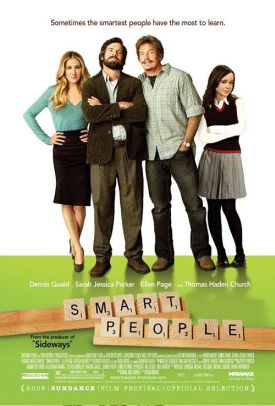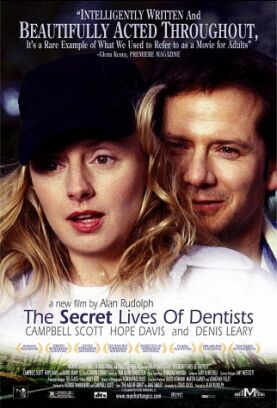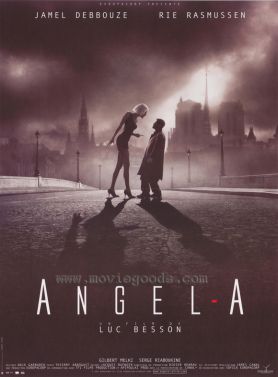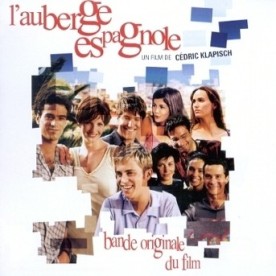Smart People
Any movie titled Smart People is bound to create certain expectations in the viewer. Obviously, you can’t take smart people as your subject without being pretty smart yourself. So the movie will be, as Mark Jude Poirier’s and Noam Murro’s movie with that title is, in part a demonstration of the movie-makers’ braininess — or at least of what they imagine audiences will accept as evidence of braininess. Now establishing the smarts of a character in a movie is the easiest thing in the world to do. Simply set the film in a university and make your hero a professor. Give him one or two scenes in a classroom saying hard-to-understand things about obscure or recondite subjects and your job is done. But making his intelligence his outstanding feature and the only point of interest or attractiveness about him is a little bit trickier. So is demonstrating your own intelligence. Both require that something actually intelligent should be said.
That’s where Smart People falls down. It has nothing genuinely smart to say. Like that of its characters, its intelligence is all posturing and showing-off. Instead of understanding hard-to-understand things, or even making them sound very intelligent, it relies on making the hero’s allegedly brainy remarks as offensive and self-important in the utterance as possible on the grounds, presumably, that anything that arrogant must also be smart. But it is possible to be arrogant without being smart and, so far as we can tell, this is the case with Lawrence Wetherhold (Dennis Quaid), professor of Victorian literature at Carnegie-Mellon, who appears to have gone around with an offensive attitude to his students, colleagues and family since long before he acquired what he regards as an excuse for it in the death of his wife.
What does being smart have to do with anything anyway? Lawrence Wetherhold is a nasty, self-absorbed, self-pitying, inconsiderate and overbearing father, brother, teacher. Nobody likes him, and neither do we. This makes it frankly unbelievable when a former student, now an emergency room doctor named Janet Hartigan (Sarah Jessica Parker) falls for him and, in concert with Chuck (Thomas Haden Church), a despised ne’er-do-well brother who moves in with him and his two alienated kids, strikes some sparks of humanity in the ashes of his dead soul. My suspicion is that the authors are relying on what is by now the well-established fact of the professor’s high intelligence to make up for the human qualities he lacks.
In the age of the cognitive élite, just having brains must be supposed to be enough to make a man not only attractive to beautiful women but worth the human cost of any attempt to redeem him. “I know I’m a miserable a******,” he says in the end to Dr Hartigan, “but I do have some hope for myself.” Well isn’t that special? It is as near as he gets to humility or likability, but it’s not anywhere remotely near enough to make us believe that a real-life girlfriend with any sense would have stuck around long enough to hear him say it.
Here’s the professor’s idea, first suggested by his almost equally nasty Young Republican daughter, Vanessa (Ellen Page), for a hot-selling book title: You Can’t Read! It’s apparently Messrs Poirier and Murro’s idea of one too, since it is a big selling point when the book is accepted for publication by Penguin. “That surly, smarter-than-thou tone” will get it attacked on NPR, says the professor’s editor approvingly — and that will lead on to Charlie Rose and so to the conquest of all media. Yeah, being smarter-than-thou is one affectation that has no place on NPR! “It’s almost like the book itself is a f****** bully,” says the editor with admiration. “You Can’t Read! Brilliant!”
Only someone as self-absorbed as Wetherhold himself could believe in this scenario for fame and fortune. Those who over-value intelligence naturally suppose that everyone else does too, but my guess is that most people, maybe even Charlie Rose, would fail to find the attractiveness in intellectual bullying.
Another problem for the film lies in its casting. There are actors who automatically convey intelligence, and liveliness of mind, irrespective of whether or not they actually possess these qualities. John Cusack is one of them. So is Cate Blanchett. Dennis Quaid is not. Such attraction as he possesses lies in his ordinariness and unpretentiousness. In this best roles, he reminds you of a big shaggy dog who is eager once again to chase the stick he has just brought back to you. To put him in a role like this one is only to accentuate his character’s bad qualities while at the same time making them even more unbelievable than they already are.
Ellen Page and Thomas Haden Church are both playing more to type — Miss Page being one of the very few actresses of her age who, on the strength of Juno, can be said to have a type — but this also turns out to be a mistake, since it makes all the more obvious the fact that their parts are over-written to the point of caricature. To ask us to believe that Vanessa would go up to a high school classmate in a bar and say, “What’s it like, being stupid?” — or that it would have to be pointed out to her by Chuck that people don’t like it when you say things like that to them — is almost as unbelievable as having Sarah Jessica Parker fall in love with a man whose only redeeming feature is a brain of which we are frequently reminded but of which we are allowed to see little or no real evidence.
Perhaps the film-makers imagine that showing their professor is disliked for, among many other things, his assertions of superior intelligence, conveys the impression that they must be at least his equal in intelligence, since they have imagined an alternative way for him to show it. In other words, telling us that their creation is showing off is a slightly more subtle way of showing off themselves. Anyway, that’s my explanation of why this movie brings to my mind the dictum of Stephen Hawking that only losers boast about their intelligence.
Discover more from James Bowman
Subscribe to get the latest posts to your email.








